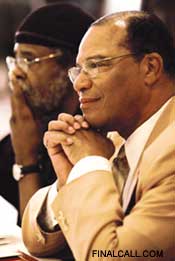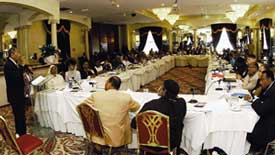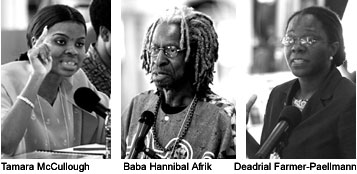
CHICAGO (FinalCall.com) – There’s a certain moment in time, that if leaders have the wisdom to see and seize it, they can make a historic turn in the lives of their people. Such a moment was the July 26 summit on reparations, the Honorable Minister Louis Farrakhan said as he opened the meeting held at the Salaam Restaurant.
Nearly 50 activists from across the country answered the call to discuss operational unity and a consolidation of efforts, in order to enhance and fortify the movement for reparations for Black people’s suffering in the trans-Atlantic slave trade.
“The principle of reparations is the one great principle that we all can unite around,” Min. Farrakhan stated in his opening remarks. “Religion has not united us. Politics has not united us. Our economic needs have not united us. Our Blackness has not united us.
“But in the principle of reparations, all of us have a stake in it and see the value of it and know that if we unite today on the basis of reparations, then our children and our children’s children can be the beneficiaries of what happens today and from this day forward.”
Gathered together in the Ashanti practice of the principle of consensus, the “big sitting-down”–or ndaba, as the South African Nguni call it–was the fruition of the vision of Dr. Conrad Worrill, the national chairman of the National Black United Front (NBUF).

“It was our position that Minister Farrakhan and the Nation of Islam had the respect of our people and they would respond to his call,” Dr. Worrill said. He reminded the group that the resurgence of the idea for reparations in the 1960s was planted in the Muhammad Speaks newspaper, and he extended his gratitude to the Honorable Elijah Muhammad, and Malcolm X for making the idea popular again.
Various groups answered Dr. Worrill’s call through Min. Farrakhan. Several have reparations at their core agenda, such as the National Coalition of Blacks for Reparations in America (N’COBRA), the Universal Negro Improvement Association (UNIA), the New Afrikan People’s Organization (NAPO), the Republic of New Afrika (RNA), and the Restitution Study Group.
Other groups brought to the table their experiences of work based on the principles of unity and related to reparations, such as the Kwame Ture Institute, the National Association for the Advancement of Colored People (NAACP), and the New Black Panther Party.
Completing the circle of activists were pastors, lawyers, scholars, politicians, writers, professors, researchers, and simply put, Black people who know how to get other Black folks moving in the community. Elders of the movement present were Baba Hannibal Afrik, Queen Mother Erline Arikpo and Dr. Imari Obadele.
About 25 presenters reported on their respective projects and shared the key methods of their approach that have brought relative progress in the struggle for reparations.
The benefits of unity
Dr. Ronald Walters of the Academy of African American Leadership based in College Park, Md., could not attend, however, he sent a statement of unity, which was read at the start of the presentations.
He outlined the principles of unity that he suggests are necessary to maintain the dignity and purpose of the movement. He also set out three elements that are essential in forging this unity: mutual respect between organizations to prevent public criticisms of each other, which should create civility in the movement; an exchange of information relating to various lawsuits across the nation without the pressure of expected collaboration in court; and popular mobilization that requires interaction across the boundaries of organizations.
Bringing in the voice of the youth, the first presenter was Tamara McCullough, a Chicago-based activist. She researched eight generations of her family history, in order to learn about the atrocities of slavery that her family endured, which made the call for reparations a personal call.
“That gave me passion,” she told the audience. “When you know your history, you create a warrior.”
She recalled that while she was working on a book of her research, she encountered fear from elders who did not want to revisit the past. She pointed out that during the civil rights era, when more elders were alive who had survived slavery, there was no need to tell youth to fight for that which their foreparents could not, because the youth witnessed and lived the oppression of the vestiges of slavery.
However, youth today do not have any personal connection to former slaves, which is the reason they are disconnected from the movement. “It’s time that we tell these stories,” she added.
An international scope
The need for the establishment of an international congress on reparations was emphasized in the remarks of Congressman John Conyers (D-Mich.), who sponsored the H.R.40 bill that brought the demand for reparations before Congress. The idea was first proposed in Durban, South Africa, during the UN Conference on Racism. The congressman highlighted that the instruction from the U.S. government not to bring the issue of reparations during the UN conference went beyond their attempt to avoid embarrassment.
“It would ignite a brotherhood of dozens of nations who were struggling with reparations that I didn’t know anything about,” Mr. Conyers said. “If they had heard us, it would have started a world movement right on the spot.”
The congressman continued, “And that’s why the State Department was determined that they would walk out of an international United Nations Conference on Genocide that would assemble only every 15 years, before this one word would get put on the agenda.”

The church, the courts, the community
Representing Trinity Church and its pastor Reverend Jeremiah Wright, Dr. Iva Carruthers spoke of equipping ministers beyond worship, and enabling them to effectively network, empower people and impact policy. Within the next year, she intends on working with over 400 preachers, with a focus on connecting theology, technology and transnational public advocacy. She termed it: “intentional communication.”
Reverend Al Sampson, of Fernwood United Methodist Church, noted that the church must go back into the community and play a key role in providing a home to the movement.
He informed the collective that, when Deadria Farmer-Paellmann could not find an open ear for her strategy to pursue reparations in the court, he offered her his pulpit.
Ms. Paellmann, executive director of the Restitution Study Group, summarized her efforts in the consolidated federal lawsuits from nearly 20 nationwide plaintiffs against corporations that profited from participation in the slave trade, such as shipbuilders, railroads, banks, and companies within the insurance, textile and tobacco industries.
Much of the consolidated case is based on human rights precedents of crimes against humanity, but another strong component of the legal argument is consumer protection law. This will enable the litigation team to challenge the companies on the basis of their lying to the public in denials that they have no connection to the slavery, because the team has gained possession of documents that show the companies’ involvement.
Since the consolidated lawsuits are set for a Chicago courthouse, Attorney Lionel Jean Baptiste, who is representing a Chicago plaintiff, has been thrust to the forefront of the legal team. However, he cautioned the summit that the legal battle cannot stand alone in the fight for reparations.
“We understand that we are in an arena that has been set up by the slave master,” he said, “We will not win in that arena, unless we step it up in the streets, unless the political fight is brought to bear.”












